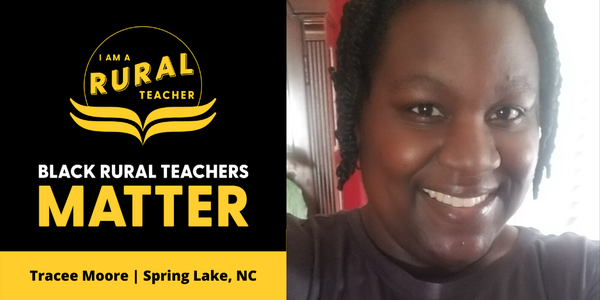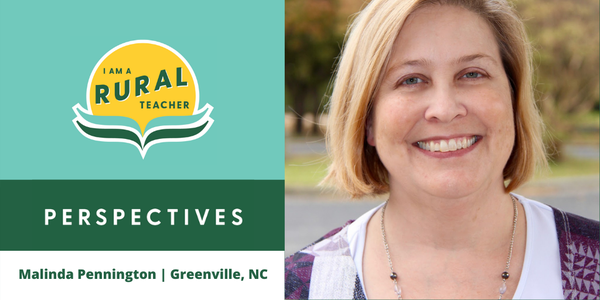We're looking forward to the National Forum to Advance Rural Education! November 12-13, 2020 Reduced registration pricing has been extended to October 16! Register today using promo code: SEPTEMBER |
|
 |
As a black teacher in a rural area, I find that I have to work ten times harder to help close the gaps that exist as well as build a positive representation for myself. Teaching in a Title 1 school, parents are often skeptical if I can fully meet the needs of their child. So I work overtime to build a positive relationship with all of my families. It becomes a true work of multitasking. I can still remember the questions about where I graduated from, if I have received any educational awards or accolades. Initially it was saddening to see how little these particular parents entrusted me with educating their child. So I made it my mission to go above and beyond to prove that I am one of the "teaching greats." Black Rural Teachers matter because we have to learn how to do more with less. We have to learn how to accomplish tasks with the bare minimum and oftentimes minimum support. I am actually a product of rural schools, and this is the very reason I chose to work in rural schools. Oftentimes these schools' resources are more limited so you have to become a master artist and learn how to intertwine different activities and materials to accomplish lessons. |
| | Read More |
|
|
 |
The East Carolina University Community School is a collaboration between Pitt County Schools and ECU to provide innovative opportunities for students who are identified as academically at-risk or zoned to attend a low-performing school under North Carolina’s Accountability model. The neighborhoods which surround our school experience families who live in a high rate of poverty and have limited access to resources. The Community School chose its name because its mission is to educate the whole child through a web of support that thrives through our community partnerships. In addition to Pitt County Schools, we partner with multiple ECU departments and community organizations to help meet the academic, physical and social/emotional needs of our scholars and their families. Our scholars benefit from innovative research-based instructional practices, an Integrated Health Care Team including a full time school counselor and school social worker, and multiple opportunities such as weekly dental care activities, haircuts, school supply donations, and a Backpack Buddies food program. Families take part in regular school activities designed to build connections and access to resources. |
| | Read More |
|
|
|  |
WASHINGTON—This week, Rep. Kendra Horn (OK-05), a member of the Blue Dog Coalition, moderated a Rural Opportunity Roundtable discussion on education and workforce development. A champion for public education, Rep. Horn recently introduced the bipartisan Coronavirus College Access and Completion Emergency Relief Act, which would provide emergency funding to the Federal TRIO Programs to support access to counseling, tutoring, mentoring and technology to help students enter and complete college. “I was grateful to speak with rural educators and education leaders to hear directly about the unique challenges rural schools and colleges face,” said Rep. Kendra Horn (OK-05). “The quality of a child’s education should not be based on their zip code or if they grew up in a rural or urban area. COVID-19 has highlighted this divide. Many of our rural students from kindergarten to technical training to college are losing out on a quality education because of a lack of resources. In Congress, I am working to ensure all students receive a quality education. This necessary investment is key to the long-term development of our rural communities.” Rep. Horn was joined by the following special guests for the discussion: - Dr. Monte Randall, Dean of Academic Affairs, College of the Muscogee Nation
- Dr. Alissa Young, President, Hopkinsville Community College
- Tamara Hiler, Director of Education, Third Way
- Dr. Allen Pratt, Executive Director, National Rural Education Association
|
| | Read More |
|
|
 |
COLLEGE BEHIND BARS is an Emmy nominated, Ken Burns and Lynn Novick documentary which tells the story of a small group of incarcerated men and women struggling to earn college degrees and turn their lives around in one of the most rigorous and effective prison education programs in the United States – the Bard Prison Initiative. Shot over four years in maximum and medium security prisons in New York State, the film takes viewers on a stark and intimate journey into one of the most pressing issues of our time – our failure to provide meaningful rehabilitation for the over two million Americans living behind bars. Through the lived experiences of the students and their families, this is a groundbreaking story of incarceration, injustice, race in America, and the transformative power of education. It raises questions we urgently need to address: What is prison for? Who has access to educational opportunity? Who among us is capable of academic excellence? How can we have justice without redemption? This film is a perfect fit for any curriculum that focuses on media literacy, current events, civics, government, sociology, economics, ethics, social studies, criminal justice, and more. The original 4 episode, 4 hour film has been modified for classroom use. |
|
|
|
| Rural Educator Weekly Spotlight: |
|
|
|
|  |
The United States is experiencing a physician shortage and rural areas are especially impacted. Programs exist to recruit college and medical students to work in rural areas, but few programs are focused on the high school “pipeline.” Medical students, residents and physicians who have lived in rural areas are more likely to practice in those areas. This article describes the development, implementation, and evaluation of a workshop to educate rural high school students about preparing for health professions careers. Evaluations of the workshop were positive and indicated increased knowledge and interest in careers in medicine and health professions. It is somewhat promising that even a brief educational program has the potential to increase interest of rural high school students to pursue medical or health professions careers, and perhaps ultimately increase the number of those practicing in rural areas. The authors discuss limitations and suggest changes for future workshop presentations. |
| | Read More |
|
|
| Legislative Updates and COVID Funding Updates |
|
|
|
| Updated October 7, 2020 This post is part of LPI's Learning in the Time of COVID-19blog series, which explores evidence-based and equity-focused strategies and investments to address the current crisis and build long-term systems capacity. The numbers are staggering. In the past 5 weeks alone, since states began to issue shelter-in-place orders, virtually all 50 states have significantly reduced economic activity in this country, and almost 22 million Americans—more than one in ten working adults—have applied for unemployment insurance. The International Monetary Fund has predicted that this will be the worst economic downturn since the Great Depression. This downturn will impact state tax revenue and thus result in reduced state P-12 education spending. The questions are, how badly will our public education system be affected, and what can we do about it? |
| | Read More |
|
|
|  |
OVERVIEW The Center for American Progress is proposing a new federal grant program to dramatically increase the federal investment in K-12 education and make education funding more equitable at the federal, state, and local levels. Introduction and summary In 2019 and 2020, policy leaders have proposed bold ideas for tackling the complex challenges and persistent inequities faced by Americans in fields as varied as health care, climate, and higher education. In K-12 education policy, one of the most fundamental challenges is the existence of inadequate and inequitable systems of school funding.
GET THE LATEST ON EDUCATION
The K-12 education system should be a powerful driver of opportunity where students learn important skills and information that empower them to explore a variety of pathways in the future. However, money matters in education, and years of chronic underinvestment at the federal, state, and local levels have undermined many aspects of school quality, negatively affecting educators and students alike. |
| | Read More |
|
|
| Policies to Maximize Spectrum Resources, Including Greater Utilization of TV White Space, Are Critical to Addressing the Digital Divide Washington, D.C. – Connect Americans Now (CAN) issued a statement Tuesday after the Federal Communications Commission (FCC) issued a draft Report and Order to help address the digital divide by clearing regulatory barriers to TV white space technology. The item is scheduled to be considered by the full Commission on October 27. “The pandemic has made more urgent than ever the need for every American to have access to broadband internet,” said CAN executive director Richard Cullen. “We commend FCC Chairman Pai for his commitment to policies that clear regulatory barriers to innovative solutions like TV white space that will help expand broadband access in unserved and underserved communities.” |
| | Read More |
|
|
| Sharing Information From Our Partners and Sponsors: |
|
|
|
| Overview Grand Challenges is a family of initiatives fostering innovation that historically solve key problems in global health and development for those most in need. These initiatives use challenges to focus attention and effort on specific problems. They can be traced back to over a century ago when a mathematician named David Hilbert defined a set of unsolved problems to spark progress in the field of mathematics. Each initiative is an experiment in the use of challenges to focus innovation on having an effect.
Balance the Equation is the first-ever Grand Challenge focused on U.S. education. The Bill & Melinda Gates Foundation is seeking to disrupt the deeply imbalanced system against this generation – and previous generations – of Black, Latino, English Learners (ELs), and students experiencing poverty in the United States, who we will refer to as priority students, as it relates to their Algebra 1 experience in 7th, 8th, or 9th grade, in-class or online. |
| | Read More |
|
|
|